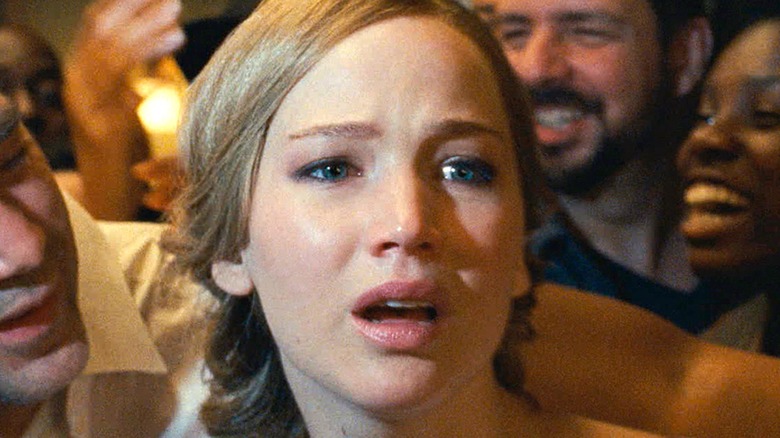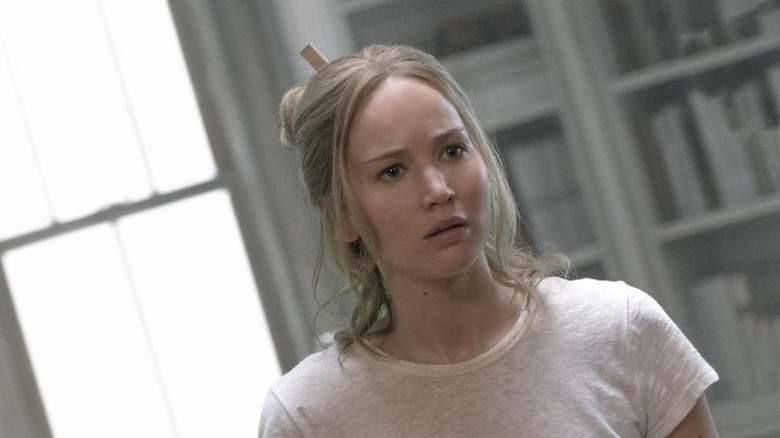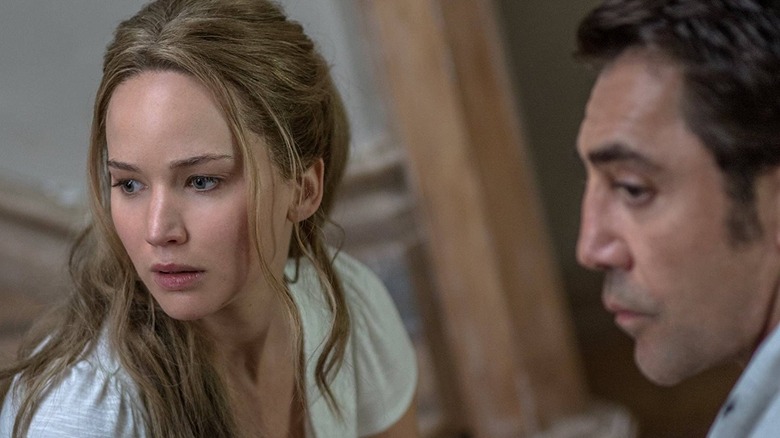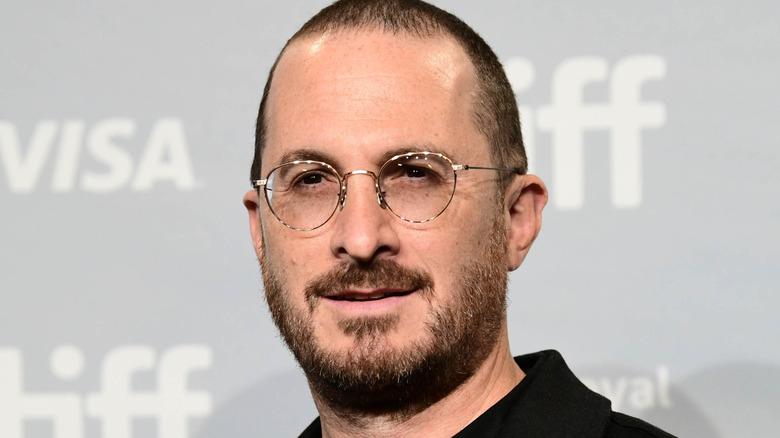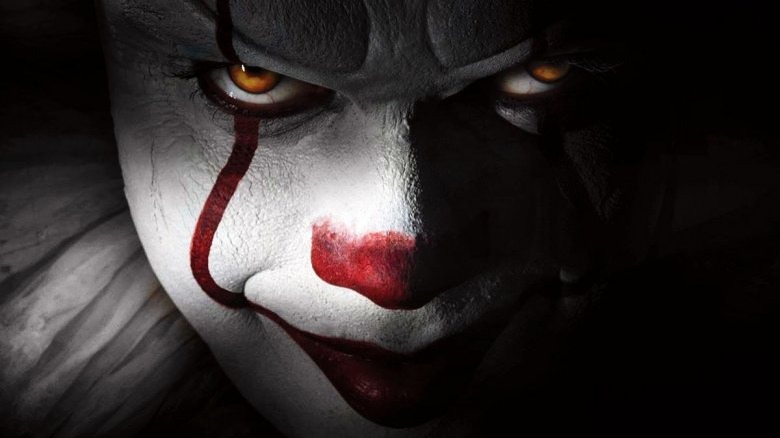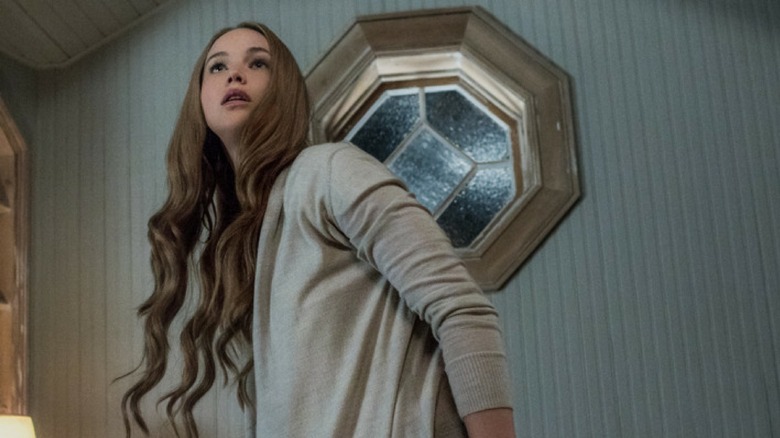The Real Reason Why Mother! Flopped At The Box Office
While It brought some much-needed life back to the box office after a disappointing summer, Darren Aronofsky's mother! is the first casualty of the fall after opening to just $7.5 million. The hard-to-define film stars Jennifer Lawrence as the title character, wife to Javier Bardem's Him and a woman who must deal with the increasing stress of unwanted visitors entering her once-peaceful home.
The film's vague log line has been a topic of discussion for months, and the movie became even more shrouded in mystery as confusing trailers and TV spots hit the airwaves. While mother! was as hard to track as it was to explain, no one expected the film to fall as far as it did, opening as Lawrence's smallest-ever wide release. While the movie had some big stars on board (including Ed Harris and Michelle Pfeiffer), it still wasn't able to find an audience. Here are the real reasons why mother! flopped at the box office.
Critics were divided
A quick perusal of the short review blurbs featured for mother! on Rotten Tomatoes (where the film holds a fresh 69 percent rating) shows how divided critics are. While some hailed the film for its visual brilliance, others were confused, calling it pretentious and over the top. "There are limits to how far one is willing to follow Aronofsky down his lunatic rabbit holes," wrote Paste Magazine's Will Leitch. "I might humbly submit that that limit is mother!."
The New Yorker's Anthony Lane had words that were even less kind, writing, "If you gave an extremely bright 15-year-old a bag of unfamiliar herbs to smoke, and $40 million or so to play with, mother! would be the result." Wrote The Wall Street Journal's John Anderson, "When the film leaves the realm of the impolite or even criminal for something far more extreme, it achieves a level of excess that makes the whole enterprise increasingly cartoonish, rather than just awful."
While there are plenty of positive reviews to offset the negative ones, many contain the caveat that the critic recognizes how divisive the movie will be, and isn't sure if it will appeal to the average moviegoer. With endorsements like that, who can blame viewers for wanting to stay home?
Audiences absolutely hated it
While many critics were in mother!'s favor, audiences most definitely were not. Viewers rejected the film on its opening night, giving it a rare F rating on CinemaScore, a widely used platform that gives films a letter grade based on surveying audiences in five random cities across the country.
While mother! isn't the first film from an auteur director to get the dreaded rating (Steven Soderbergh's Solaris also holds that distinction), it's still surprising to see a film with a director and actors of this caliber be so thoroughly docked by audiences. An F CinemaScore is extremely rare—for reference, even awfully reviewed recent films like The Emoji Movie and The Dark Tower received B grades—and in mother!'s case, news of the sad distinction spread quickly, tainting the film's online conversation.
While some fought back against the film's rating on social media, and others pointed to its higher Rotten Tomatoes audience score, Googling mother! or searching for its hashtags on social media sites still brought up articles about audiences' negative feelings about the film, likely souring potential viewers.
No one's sure what the movie's about
Do you want to know what else came up when you Googled mother! on its opening weekend? Long, almost term paper-like explanations of what, exactly, is going on on the movie. (Before and shortly after the film was released, searches for "what is the movie mother! about" and "mother! movie meaning" spiked.) While audiences often enjoy twisty films, with mother!, the biggest problem seems to be that no one can agree on the true meaning.
Let's start with some of the most prominent theories. The first is the allegory that most people probably noticed when watching the film—mother!, as some say, is a retelling of the Bible. This theory, along with a few others, says Lawrence's character actually represents Mother Earth, while Bardem's character is God. The film also contains its own Cain and Abel story and its own version of Noah's flood.
The Biblical allegory has worked for films before, and Aronofsky has also pursued that story in the past, with 2014's Noah. However, a number of the plot points don't quite line up, leading people to pursue (many, many) other theories, including the film as a commentary on climate change or the nature of celebrity and art—or something else entirety.
mother! will likely be the subject of many a film school research paper in years to come, but for the general audience, the film's confusing plot wasn't exactly a selling point. Just a quick scroll through reactions on social media reveals that many viewers were left confused and generally dissatisfied.
It wasn't the Jennifer Lawrence people expected
Jennifer Lawrence has amassed a huge fanbase playing strong, outspoken women in movies like The Hunger Games and Silver Linings Playbook. Her fans made up a large portion of mother!'s audience—38 percent of those surveyed who saw the film opening night said they did so because of Lawrence—but they didn't exactly get the Lawrence they expected.
It's hard to pin down what, exactly, was going on with Lawrence's mother! character, and while there were certainly times when she exuded strength, she spent most of the movie passively following the whims of others, particularly her husband. Lawrence's Mother is willing to do anything for her man, despite the fact that he often seems dismissive of her.
The character was described by one reviewer as "a domesticated doormat," and while that might be a bit harsh, it's tough not to draw comparisons to some of her other, feistier characters and to notice how much more vibrant and alive she seems in those roles. There's much to be read into the submissiveness of the character, but it's definitely very different from her previous work, and her fans don't seem happy with it.
And it wasn't the movie people expected either
If you watched any of the clips or trailers for mother!—or saw its eye-catching poster, featuring Lawrence holding her own heart—it would make sense if you expected a straight-up horror movie. The marketing material pulled out the film's biggest scares, using the sounds of a ticking clock and gut-wrenching music to underscore what seemed to be a psychologically focused haunted house movie.
This marketing campaign worked well, in a way—43 percent of those surveyed said that they came out to the theater because they thought they were seeing a horror film. However, in the end, the campaign backfired, because mother! is nothing like your typical horror movie.
Instead, the movie delves into the human psyche, albeit with some very freaky imagery. While those who were familiar with Aronofsky's work wouldn't be all too surprised to hear that, those who were just following the cues left in the film's marketing were likely fairly turned off.
Even Aronofsky fans didn't love it
Aronofsky fans were likely the most prepared for every WTF moment mother! had to offer. The writer-director has a habit of making films meant to mess with your head, and fans were primed to expect a movie that went down a less traditional path than your average horror flick. However, while those who've enjoyed Aronofsky's previous work were willing to give mother! higher marks, most still weren't impressed with the movie.
Ten percent of those surveyed said they headed out to see the film on Friday night because they were fans of Aronofsky. They gave the film a paltry C+, barely above the C CinemaScore given by overall audiences to Aronofsky's divisive Noah. With even Aronofsky's fans reluctant to hop on board with mother!, it would be hard to convince those who unfamiliar with his work to go along for the ride with what might be his most bizarre film yet.
The release date was pushed up
Choosing the perfect release date can be all-important to a film's success, and studios will occasionally shift around titles based on what other companies are scheduling. This was the case with mother!, which saw its planned October release moved up a month thanks to Universal's placement of the horror flick Happy Death Day, which Paramount thought would compete for young female audiences.
While Happy Death Day may have provided ample competition for mother!, the new release date certainly wasn't without its own road blocks to success. At the time the change was made, no real marketing for the film had been done, aside from the poster. For most filmgoers, the movie wasn't even a thought yet—a problem when going up against films that have been teasing trailers and clips for months.
Footage eventually made its way out, but mother!'s release date shift left it far behind on a traditional marketing schedule, leaving it up to viewers to seek it out for themselves. Considering the star power attached, mother! might not need as much advertising as some films, but an extra month to get people talking definitely couldn't have hurt.
The competition was too tough
The studio moved mother!'s release date to avoid some competition, but it ended up right in the midst of another movie's record-breaking box office run: Andy Muschietti's adaptation of Stephen King's It blew away box office records in its opening weekend and went on to become the highest-grossing September film of all time.
The film earned this title during its second week at number one—the week mother! arrived in theaters. While it would have been hard to predict It's absolutely astronomical success, it was pretty obvious from a long way out that the film had the potential to become a horror hit. Although mother! and It really shouldn't be competing for the same audiences, the marketing suggested otherwise, and fans who were looking to get scared likely went to the film with more word of mouth.
It wasn't designed for a wide release
Despite the big stars attached, mother! is ultimately an arthouse film, and one that really isn't designed for a wide audience. Paramount, however, decided to release it in more than 2,300 theaters right away.
Generally, a niche film is released in a small number of theaters before building to more screens as word of mouth starts to spread. This strategy has worked well for Lawrence's movies in the past, buoying American Hustle and Silver Linings Playbook to big box office hauls.
Paramount chose not to do this with mother!, most likely hoping that fans of Lawrence and Aronofsky would hear about the movie and head out to theaters, building word of mouth from there, and preventing a negative reaction from audiences in limited release tainting the film when it went wide. While this makes sense, it's hard for a film as niche as mother! to reach audiences this quickly, even with big names on board. Although it would have been a risk, Paramount might have been better off going with a slow rollout.
